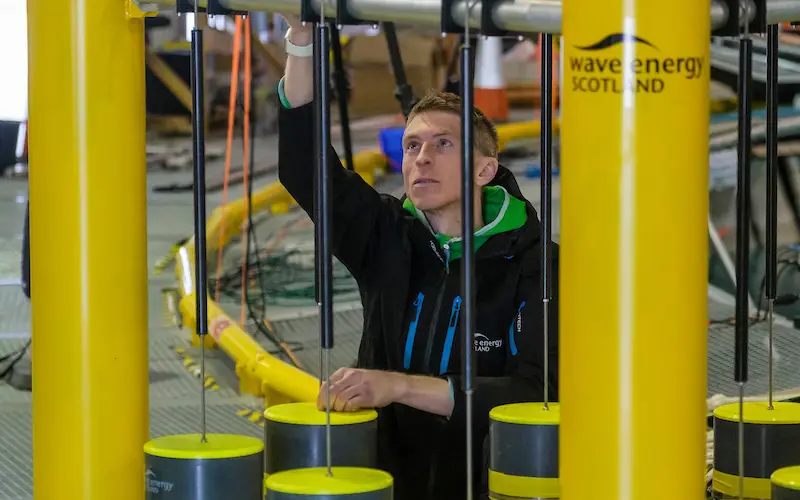
Reflections on the “Value of Wave Energy Deployment to the Scottish Economy” report
By Matthew Holland, Senior Project Engineer
When you work in an exciting sector that is undergoing rapid development and evolution, it is easy to see the great opportunities and potential it has to offer. Communicating that potential without it appearing as overly optimistic is more challenging. The great advantage now is that, with this new study from the University of Edinburgh, the opportunities created by the wave energy sector to Scotland are made clear. Their report illustrates a very tangible and compelling economic case for the continued support of the sector, with the energy delivered, energy security, and net zero benefits associated with it gilding the lily.
The numbers that could be achieved by 2050 are enticing, and bear repeating: a potential market for 4.5GW of installed wave energy that can provide clean electricity to Scotland’s population and industry, over £4.2bn of economic benefits to the economy, and over 9,700 high-value jobs supported by the burgeoning sector.
The potential prize is immense, but this won’t be achieved without effort and support from all the relevant stakeholders. We are fortunate that the Scottish Government’s belief in the sector and Wave Energy Scotland has enabled technologies to continue to advance during the last 10 years. But, to maximise the future opportunities we need strong leadership and demonstration of support from government and policy makers - this will give investors comfort in the ambition, potential and timescales for returns on their investment. Now is the time to really push these technologies and the whole sector towards commercialisation.
To help accomplish this, the report presents seven recommendations which cover aspects such as financial backing, supply chain and infrastructure investment. But what do these recommendations really mean for those of us working in wave energy?
To achieve the socioeconomic opportunities identified in the report, significant financial and policy support is essential, not just from Scottish Government but also from the UK and international collaborations. Increased financial backing is a priority in order to deliver the initial arrays of innovative technologies, which can evidence the positive trajectory of reduced cost and improved efficiency that will build confidence and unlock private sector investment. Alongside this, it is necessary to continue to negotiate market support mechanisms, such as a CfD, that will be enticing for project developers and which can bolster the early stages of market growth.
The supply chain needs to grow across the board to meet the demands of our offshore renewable energy sector, and without a doubt the collective growth in offshore wind, tidal and wave energy will be placing urgent demands on its capabilities. GW-scale levels of deployment by 2050 mean 100’s of winds turbines and 1000’s of marine energy converters have to be built and maintained, illustrating just how much the supply chain and supporting infrastructure needs to grow over the next few decades.
Meanwhile, with modernisation projects such as port expansions potentially taking up to 10 years to deliver, it’s clear that growth and progress will take time to realise. This means focused, pre-emptive investment is needed now in key infrastructure such as ports, harbours and the national grid. Growth in enabling infrastructure needs to be underpinned by investment in the development of a skilled workforce that is trained and ready to meet the needs of the sector, and support for the modernisation of the Scottish supply chain through enhanced manufacture techniques, automation and digitisation that will allow it to compete on a global scale for the vast manufacturing contracts that will be available. If all the developing renewable sectors work collaboratively, we can collectively steer the supply chain towards a secure and prosperous future that can deliver for us all.
The final recommendation covers support, and we are fortunate within Scotland to have a number of experienced innovation support organisations and enterprise agencies who can oversee the implementation and delivery of these actions. This isn’t just Wave Energy Scotland, but also others such as Scottish Enterprise and Highlands and Islands Enterprise, while Scottish Development International will also be key to maximising the vast export market potential. Ongoing cross-party political support for these organisations will put Scotland in the best position to deliver on the exceptional technical, economic and social opportunities that this report highlights are within our grasp.
Marine renewables are intrinsic to our energy future; we just need to make sure we are ready to maximise the opportunity they afford.
Read the Economic Impact of Wave Energy in Scotland report.
